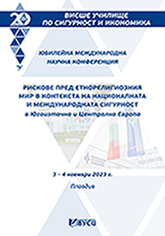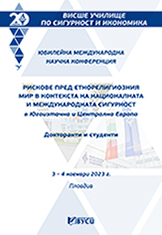Ескалацията на етнорелигиозното насилие в Западна и Централна Африка като заплаха за сигурността на държавите от Европейския съюз
Author(s): Teodor Danailov Dechev / Language(s): English,Bulgarian
/ Publication Year: 0
Keywords: West Africa; ethno violence; religious violence; Salafist networks; Tuaregs; Fulani; Wagner
The report is devoted to the problems of the escalation of ethno-religious violence in West and Central Africa and its relationship with the national security problems of the countries of the European Union, in particular – the countries of the Mediterranean basin and South-Eastern Europe. The problem is rooted in the infiltration and deployment in the West African region of radical Islamic terrorist networks and terrorist DISORGANIZATIONS such as Al Qaeda, the Islamic State of West Africa, the Islamic State of the Greater Sahara, as well as some lesser-known but highly effective Salafist networks. Initially, they took advantage of another rise of the Tuaregs fighting for an independent state in Mali, and between the ethno-centric nationalist Tuareg organizations and the Salafists, emerged particular structures of symbiosis between radical Islamism and nationalism, which the author characterizes as „double bottom organizations“. The defeat of the Gaddafi regime (on whose side many Tuareg militias are fighting) during the „Arab Spring“ also played a favorable role in this development. The Tuareg returned from Libya with a large amount of weapons, which they are using against the government authorities – first of all in Mali. The Tuareg-Salafist uprising that broke out in the northern part of Mali was suppressed by French troops with the mandate of the UN Security Council. The Tuareg concluded a truce with the Malian authorities, but Islamic radicals continued an intense guerrilla war that spread to central Mali and also to a very large extent to Burkina Faso (Upper Volta). The failure of the authorities to combat subversive acts and terror operated by radical Islamists became the occasion (though not the main cause) for a series of coups in Mali and Burkina Faso, which were followed by Niger and Gabon, despite the fact that such guerilla military actions were not taking place particularly in Gabon. A particular risk is the possibility of the Fulani people (also known as Fulah or Fulbe) siding with the radical Islamists. The Fulani are a group of semi-nomadic tribes engaged in migratory animal husbandry that inhabit the entire belt south of the Sahara from the Gulf of Guinea to the Red Sea and number about 37 million people. In principle, the Fulani belong as a confession to the Sufi branch of Islam, known for its tolerance, but on the other hand, they are treated by the state authorities in the countries where they live as „second-class“ people, because the sedentary lifestyle is tolerated in the region. In some countries, there is outright ethnic enmity against the Fulani. This causes a certain tendency of younger Fulani to join the ranks of the radical Islamists and is the basis of the movement of the guerrilla war from the northern part of Mali to its central part. The Fulani have traditional problems with the settled agricultural population, but to this problem are added environmental problems caused by climate changes and the corresponding expansion of the Sahara desert to the south, as well as the emergence of so-called „neo-pastoralism“. Unlike the Fulani and traditional nomadic herders, where the herds are family-owned and the number of head of cattle in them is medium or small, the „new pastoralism“ is a reflection of the attempts of corrupt elites in West African countries, especially Nigeria to hide their financial resources in the possession of livestock. Unlike the Fulani and traditional migratory herders, the „new herdsmen“ are not owners but mercenaries who are well armed with automatic long-barreled weapons. They enter into sharp conflicts with the settled agricultural population. A dangerous synergy arises because the Fulani are Muslims, one of the peoples who brought Islam to West Africa, while the majority of settled farmers are Christians. A separate issue is the existing friction between the individual ethnic groups. When the ecological pressures caused by the expansion of desert lands in southern direction and the phenomenon of „neo-pastoralism“ as a result of the fight against corruption and the hiding of „dirty money“ in livestock ownership are added to this, a dangerous „explosive mixture“ arises that favors the guerilla and terrorist activity of Islamic radicals and appears as a great occasion for the rise of an authoritarian wave of military coups in the region. The fact that along the belt where the Fulani live, the presence of the private military company „Wagner“ is increasingly established. (Its possible restructuring in the near or distant future is of no importance here). Tactically, PMC „Wagner“ is implementing a certain business plan, which includes serving the coup regimes for a fee and the exploitation of certain natural resources in the countries of West and Central Africa. PMC „Wagner“ have already „distinguished themselves“ with several massacres of the Fulani in Mali, and they have a particularly strong presence in the Central African Republic, where it can be said that Russian mercenaries are literally involved in state governance. In fact, with its presence in Mauritania, Mali, Burkina Faso, Chad, the Central African Republic, Sudan, and South Sudan, PMC Wagner is establishing a chain of outposts that coincides with the Fulani migratory herding route. In this, according to the author, there is nothing accidental, because in addition to the short-term tactical tasks related to the usual mercenary business, PMC „Wagner“ and other Russian expeditionary colonial forces in West and Central Africa could effectively intervene in the growing guerrilla war in the region and contribute for its sharp escalation. The result of such an escalation would most likely be an unprecedented migration wave, for which the EU countries, in particular the countries of the Mediterranean basin and South-Eastern Europe, are not yet prepared.
More...


